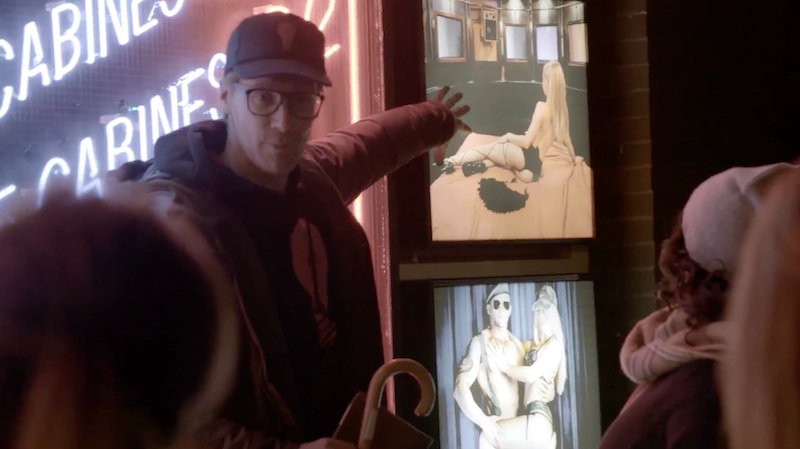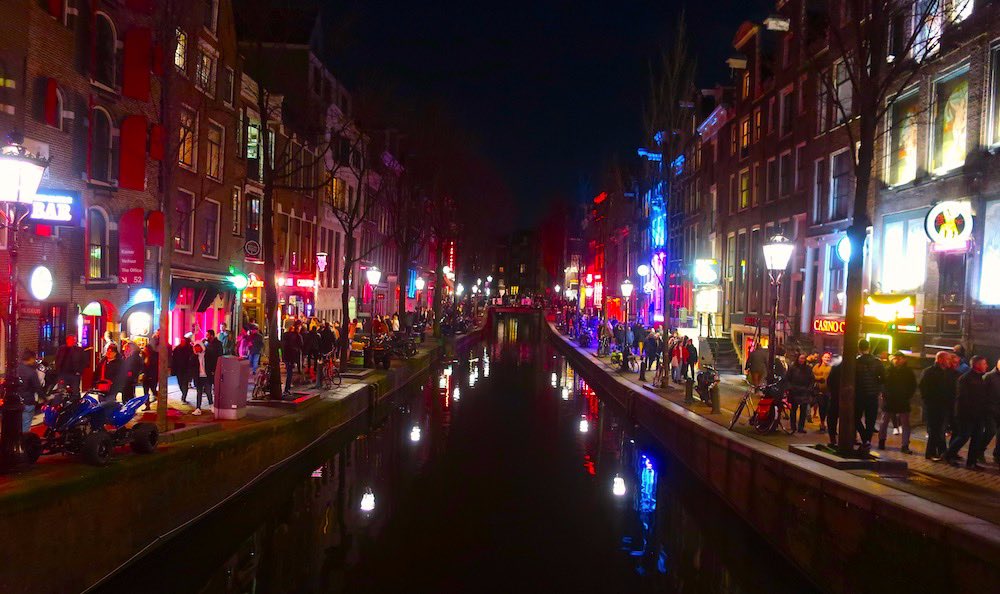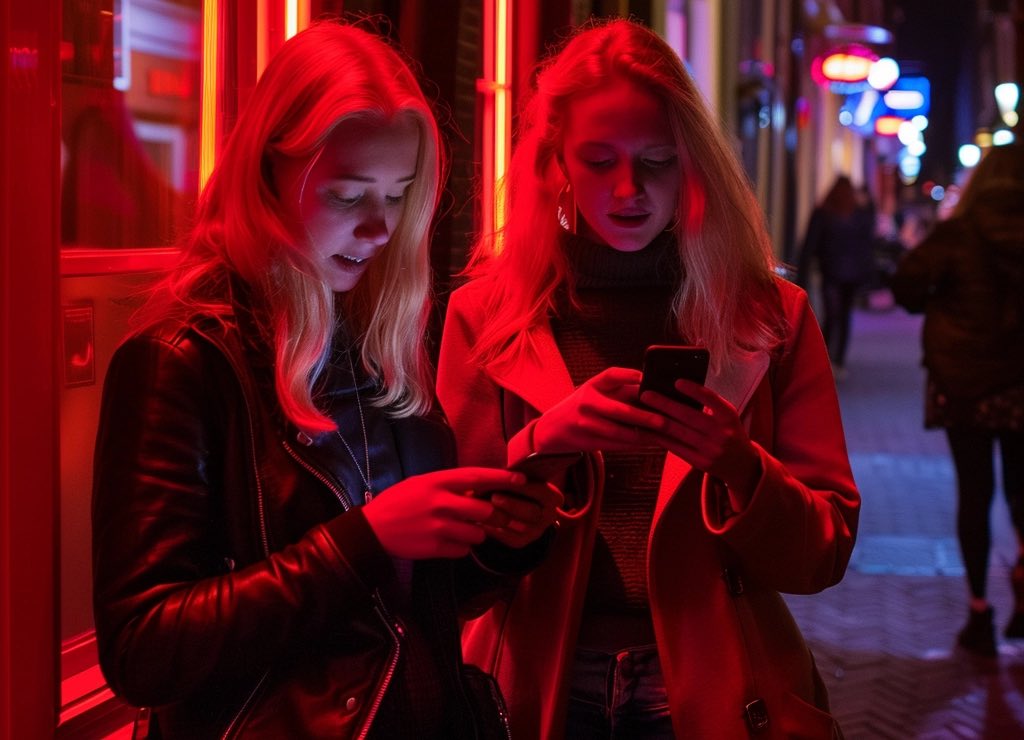New Amsterdam Red Light District Documentary Very Popular
Posted on: March 1, 2018

New Popular Amsterdam Red Light District Documentary
Dutch TV broadcaster BNN recently made a very interesting Amsterdam Red Light District Documentary. The documentary makers interviewed prostitutes, residents, brothel owners, brothel cleaners, tourists, strippers, local authorities, our tour company owner and many other experts. The production team contacted us and asked if they could join one of our Red Light District tours to get a better understanding of “De Wallen”. Our company owner hosted the tour for the film crew and 10 tourists. Afterwards, the owner and the tourists were interviewed by famous Dutch presenter Fillemon Wesselink.

Our Red Light District tour group in front of world’s first condom shop.
The Amsterdam Red Light District Documentary became very popular in the Netherlands and was viewed by almost 2 million people. Holland’s capital has been in the Dutch news lately because of increased popularity & tourism and its accompanying issues that have mostly to do with crowdedness and congestion in certain areas. These issues are a direct result of the government closing down many window brothels & coffeeshops, as part of Project 1012, and thus shrinking the Red Light District area. Since the financial crisis, the City of Amsterdam also invested heavily into tourism, international marketing and founded IAmsterdam.com – its city marketing organization. The investments of the municipality also led to a big increase in the number of visitors to the city.
Amsterdam Red Light District Rules: The Convenant
Our company voluntarily signed a covenant back in April 2017, together with around 35% of all other tour operators, and the City of Amsterdam. The convenant was a co-initiative from the local government and was intended to improve the livability of the area for everyone in the Red Light District. By signing the convenant tour operators agreed to certain rules like: shrinking their groups to 20 persons, not hosting tours after 11 pm, no longer standing still at certain busy spots, etc. Our groups also stay clear of certain shop entrances. We did this to improve the flow-through of people in the area.
60% of Tour Operators In Amsterdam Didn’t Care About Red Light District Rules
However, >60% of the (international and national) tour operators didn’t want to take part in the convenant. They didn’t want to improve Amsterdam’s Red Light District voluntarily. They didn’t seem to care about the complaints of residents, prostitutes and entrepreneurs. One of those tour operators that refused to sign the covenant of the City of Amsterdam in April 2017 was Sandemans Europe Tours. Sandemans made it clear from the start that they would only change their ways when they would really have to; when the local government actually changes the law in Amsterdam.
New Red Light District Laws For Tour Operators In Amsterdam
The City of Amsterdam has now decided that the problems won’t be solved on a voluntary basis. The terms contained in the orignally voluntary covenant have now been implemented into law.
License For Tour Guides In Amsterdam’s Red Light District
Starting April 2018 tour groups will only be allowed to have a maximum number of 20 people. All tour guides will have to get a license from the City of Amsterdam. When a guide breaks the rules three times, it will lead to a loss of his or her license to guide. Police and local government enforcers in Amsterdam will see to it that everybody lives up to these new Red Light District rules. Our company already agreed to these new measures voluntarily so we fully support this new approach. We have the utmost respect for the Red Light District, the sex workers and all of the inhabitants. Hopefully, the new laws will solve the current issues.
For more info on the current situation in the Red Light District you can read the interview that our company owner did with BNN. The four-part Amsterdam Red Light District documentary can be viewed here. The Amsterdam Red Light District documentary aired its first episode on the 2nd of November 2017. Elard’s interview can be found in part two of the series.

Our company owner: Elard, being interviewed for the Amsterdam Red Light District Documentary.
Amsterdam Red Light District Documentary Interview With Tour Company Owner:
F (Filemon, presenter): A lot of prostitutes experience hindrance from tourists that take their pictures. Does your company do anything about that?
E (Elard, company owner): Yes, of course. At the start of every tour our guests are told that it’s forbidden to take pictures of the prostitutes. We always tell them that the prostitutes often lead double lives. They often don’t tell their friends and family about their work here and that this is probably the main reason why they don’t want to be photographed.
F: It’s becoming ever more busy in the Red Light District, do you notice this yourself as well?
E: Yes, I’ve been doing this for several years now and I do notice that the area is becoming more crowded. I can’t deny this.
F: Your company is of course a part of this.
E: Exactly. From the start our company has always been doing these tours with a maximum of 25 persons, which we recently decreased to 20 in consultation with the municipal government. Twenty is now our maximum tour group size and we will stick to the agreement.
F: Does everybody comply with this?
E: No, definitely not. There are many tour operators, predominately from abroad, who continually walk with groups of up to 50 persons and with just one guide. That screws up the neighborhood. There are around 20 to 30 operators that do stick to the rules, but 200 to 300 tour operators that don’t.
Should There Be Stricter Amsterdam Red Light District Rules?
F: Should there be stricter regulations?
E: Yes, I do think so. I’ve signed the covenant for my company with the City of Amsterdam, but if you break that agreement you won’t get a fine or lose your permit because those don’t exist.
F: So the covenant doesn’t have teeth?
E: No, I don’t think so.
 Elard guides the tour group through the Red Light District, locally known as “De Wallen”.
Elard guides the tour group through the Red Light District, locally known as “De Wallen”.
What Led To The New Amsterdam Red Light District Rules?
F: Has it also become busier because a number of window brothels have been closed down?
E: Yes, I believe that to be the case. The area used to be more spread out. I think the blame can also be laid with the City of Amsterdam who’s been responsible for the closure of the window brothels. The result is that many people want to visit the area these days and can only visit these specific spots.
F: What should the municipality do?
E: What I think they could do is implement one-way traffic for the pedestrians in certain parts. For instance, at the Oudezijds Achterburgwal, people walk on two streets (note: streets on both sides of the canal) in both directions. If you were to regulate that more, so right side (of the canal) is walk that way and left side the other way you would already have a better flow trough of the people.
F: Amsterdam is known around the world as a party city where anything is possible, and legal. Do you yourself notice any excess?
E: Yes, sometimes I do. People who throw up, people jump in the canals, people who fall into the canal and even occasional fights.
F: Should the Dutch authorities enforce more?
E: The authorities could enforce better. There is oversight here but it’s not like you have to watch what you’re doing because there are cops everywhere. So when I compare it to a different city, New York for instance; you clearly notice over there that you have to watch out with what you do in the public space.
The Amsterdam Red Light District Interview
The interview ends at 39:10.








